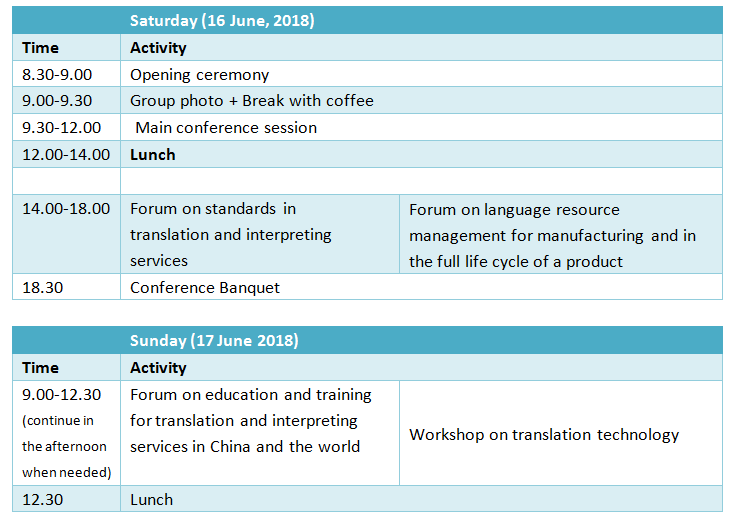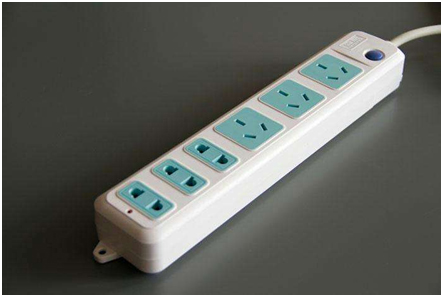| International Conference on Standardization of Language Resources and Translation and Interpreting Services (2018) |
| Date: 2018-04-05 |
 |
|
The fast pace of economic development in China has meant that translation and interpreting services have become increasingly important. These services are essential for Chinese companies to sell its products and services globally and for other countries to sell in China. To coincide with the international meetings of standards for "language and terminology", which will take place from 10 to 15 June, 2018 in Hangzhou, this "International Conference on Standardization for Language Resources and Translation and Interpreting (2018)" is being organized and will take place from 16 to 17 June, 2018. The conference is geared to serve as a platform for international communication and exchange among individuals, organizations, and companies who are interested in language resource management, translation services and interpreting services as well as in standardization. Presentations, workshops and panel discussions are organized in the following four tracks: Date and venue: Organizers: Guided by: Organized by: Co-organized by: Supported by: InfoTerm Rundown and speakers
Detailed program: 1. Opening ceremony and the main conference session (Saturday, 16 June, 2018)8.30-9.00 Welcome – from SAC, Hangzhou government, CNIS and ISO/TC37 Inauguration of “translation clouds for standards release 1.0 9.00-9.30 Group photo +Break with coffee 9.30-12.00 Keynote speeches (20 minutes plus 5 minutes Q&As each): 1) Language and terminology play a critical role in all aspects of digital content management and processing in the current and fast developing information technology landscape (Laurent Romary, Chair of ISO/TC37, Research professor (Directeur de recherche) at INRIA (Institut National de Recherche en Informatique et Automatique, France)) 2) Language services and Standardization in China (TBD) 3) Trends of translation industry in Europe (Monika Popiolek, President MAart Agency Ltd. President PSBT (Polish Association of Translation Companies), EUATC, PKN (Poland) expert to ISO TC 37) 4) New demands came up in Chinese online commerce (representatives from Alibaba, China) 5) User Information in the Context of Industry 4.0 and Made in China 2025 (Michael Fritz, Executive Director of TeKom, Germany) 6) “Quality of interpreting services in a multilingual context” (Alexandra Panagakou, European Commission) 2. Forum on standards in translation and interpreting services (Saturday, 16 June, 2018) Guidelines to procure translation services: a standard developed by the Chinese Association of Translation Services (Frank Wei, President, Master Translation Services Co., Ltd., China) Promoting quality in legal interpreting through ISO standards (Liese Katschinka Expert, EULITA (European Legal Interpreters and Translators Association)) “Promoting quality interpreting through quality equipment: five technical ISO standards” (Marguerite Lely, European commission) Proactive player -- a new role for interpreting equipment providers (representative from TAIDEN Industrial Co., Ltd. China) An Introduction to Huawei's Interpreting Guidelines and Quality Management (Tiantian Xu, Team Leader, Huawei Translation & Interpretation Department)
3. Forum on Language Resource Management for Manufacturing and in the Full Life Cycle of a Product (Saturday, 16 June, 2018) Successful Terminology Management in Companies (Klaus-Dirk Schmitz, Professor emeritus, Technische Hochschule Koln / Technical University Cologne) Terminology management in manufacture industry (representative from Goldwind Co Ltd. China) Terminological Data categories plus ISO 30042 (Hanne Smaadahl, ISO/TC37/SC3, SAP or Alan K. Melby, Chair of LTAC Global) 16.00-16.30 Break with coffee “The role of technical communication for products during the product life-cycle and a brief outlook for the fields future development” (Dr. Claudia Klumpp, Standards, Data Protection, Tekom, Germany) Speakers from Chinese manufacturers that need terminology management: 4. Workshop on translation technology (Sunday, 17 June 2018) Translation and interpreting training activities in European Commission (Alexandra Panagakou, European Commission) "Teaching and training Terminology. What do translators need?" (Rute Costa, Departamento de Linguística,Faculdade de Ciências Sociais e Humanas, Universidade Nova de Lisboa, Portugal) Chinese speakers (TDB)
The conference is open to all and we particularly welcome translation industry professionals from China and abroad. The registration fee for the conference is 1000CNY. This is waived in the case of invited speakers. For participants from outside China, only on-site registration during the conference is available when the fee can be paid in cash or credit cards. Foreign organizations who would like to exhibit their services or products should contact the organisers. For all details related to participation in the events, please contact the organizers for more details: WANG Haitao, Mobile: 13683093172 Accommodations: Xinqiao Hotel No. 226 Jiefang Road, Shangcheng, Hangzhou Hangzhou Haihua Hotel, No. 298 Qing Chun Road, Xiacheng, Hangzhou Overseas Chinese Hotel, No. 226 Jiefang Road, Shangcheng, Hangzhou Hangzhou Dahua Hotel, No. 171 Nanshan Road, Shangcheng, Hangzhou Friendship Hotel Hangzhou, No. 53, Pinghai Road, Shangcheng, Hangzhou Merchant Marco Hotel, No. 38 Pinghai Road, Shangcheng, Hangzhou ZTC LakeView Hotel Hangzhou, No. 2, HuanCheng West Road, Shangcheng, Hangzhou
Information about traveling to the meeting venue and staying in Hangzhou: Hangzhou Xiaoshan International Airport (short for Hangzhou Airport, URL: http://www.hzairport.com/en/) is now one of China's top 10 airports and among the world's top 100 airports. It is situated in the east of Hangzhou, Zhejiang Province, about 27 kilometers from the downtown city. Pinghai Line The first bus departs at 7:30am and before 2am next day buses operate at an interval of 30 minutes, with the last one departing after the day's flight operation ends. The departure time of the last bus depends on the schedule of the day's last flight. Waiting time is 30 minutes from the first passenger getting on the bus. The bus will leave as soon as it is full. Departure time from Pinghai Road The first bus leaves Pinghai Road Station at 4:45am and between 5am and 8am interval between buses is half an hour. Between 8am and 8pm, bus intervals will be approximately half an hour depending on when the buses actually arrive. The last bus leaves the station at 8:45pm. En route to the airport the bus will stop by at Hangzhou Railway Station but buses leaving the airport after 8:30pm don't stop by at the railway station. Ticket Price: 20 yuan The total route is about 70 minutes under normal road and weather conditions. Bus stops are: Weijing Hotel on Pinghai Rd and Hangzhou Coach Station at Hangzhou Railway Station (12-8 Huangcheng Rd E, under Qingtai Overpass) Inquiry Phone Number: +86-571-96299 The table is extracted from the web pages of the airport. You can visit http://www.hzairport.com/en/bus.aspx for more information as well as any possible latest update. 2 Arrival in Hangzhou at Hangzhou East Railway Station The distance from the metro stop "Longxiangqiao" to Xinqiao Hotel is about 500 meters and walk is the simplest way to find Xinqiao Hotel.
The link to website of Shanghai Pudong International (PVG) is http://en.shairport.com/pudongair.html 4 Other travel tips Post offices and banks Safety and security Emergency Weather and clothing Currency and credit card Electricity
WIFI and Internet Language
|
|
Attachments:
|
|

